1990 VOLKSWAGEN TRANSPORTER oil change
[x] Cancel search: oil changePage 72 of 165
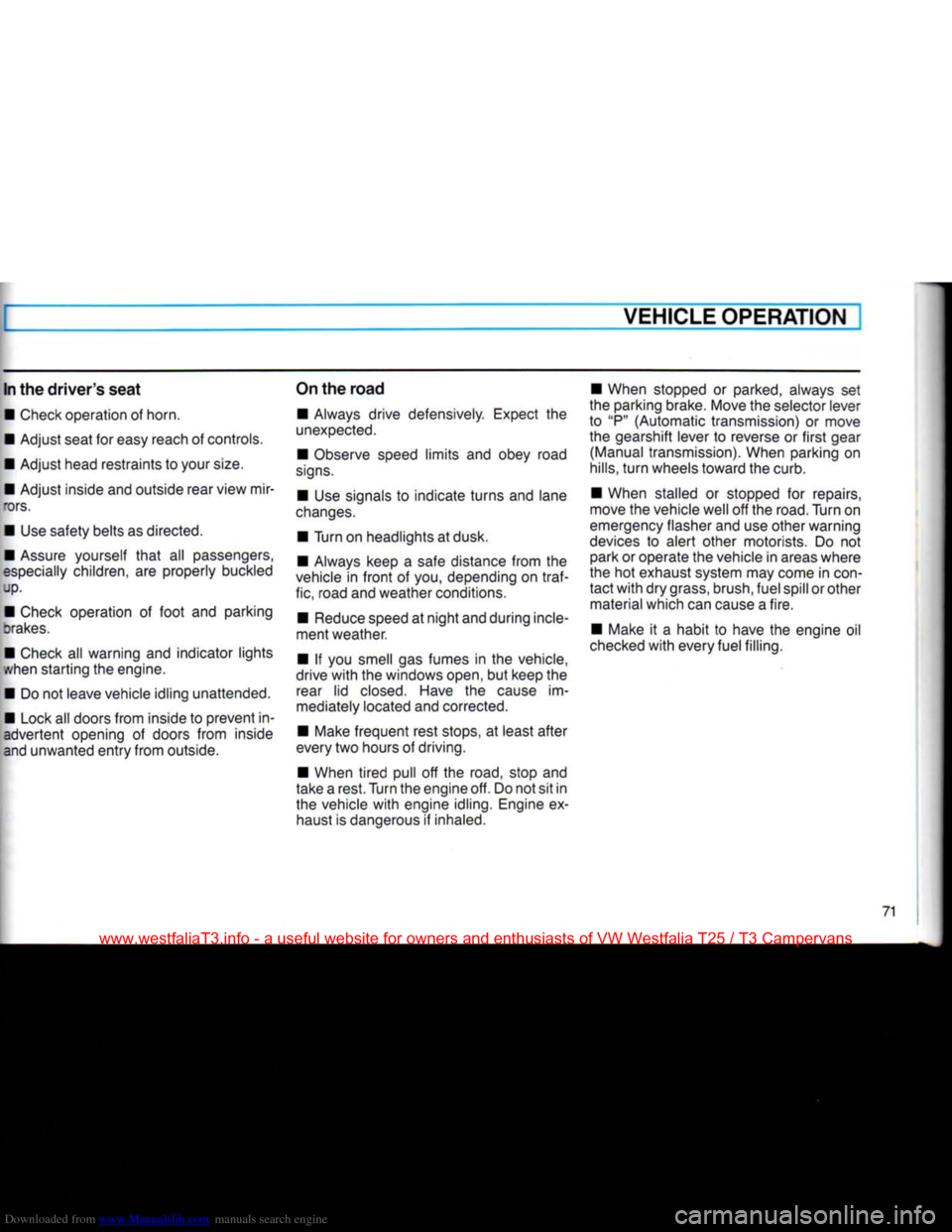
Downloaded from www.Manualslib.com manuals search engine
VEHICLE
OPERATION
In the
driver's
seat
•
Check operation of horn.
•
Adjust seat for easy reach of controls.
•
Adjust head restraints to your
size.
•
Adjust inside and outside rear view mir-
brs.
•
Use safety belts as directed.
•
Assure yourself
that
all passengers,
especially
children, are properly buckled up.
•
Check operation of
foot
and parking
orakes.
•
Check all warning and indicator lights
v/hen starting the engine.
•
Do not leave vehicle idling unattended.
•
Lock all doors
from
inside to prevent in advertent opening of doors
from
inside
and unwanted
entry
from
outside. On the
road
•
Always drive defensively. Expect the
unexpected.
•
Observe speed
limits
and obey road
signs.
•
Use signals to indicate
turns
and lane
changes.
•
Turn on headlights at dusk.
•
Always keep a safe distance
from
the
vehicle in
front
of you, depending on
traf
fic, road and weather conditions.
•
Reduce speed at
night
and during incle
ment weather.
•
If you smell gas fumes in the vehicle,
drive
with
the windows open, but keep the rear lid
closed.
Have the cause im
mediately located and corrected.
•
Make frequent rest stops, at least
after
every two hours of driving.
•
When
tired
pull off the road, stop and
take a rest. Turn the engine off. Do not sit in the vehicle
with
engine idling. Engine exhaust is dangerous if inhaled.
•
When stopped or parked, always set
the parking brake. Move the selector lever
to "P" (Automatic transmission) or move
the gearshift lever to reverse or
first
gear (Manual transmission). When parking on
hills,
turn
wheels
toward
the curb.
•
When stalled or stopped for repairs,
move the vehicle well off the road. Turn on
emergency flasher and use other warning
devices
to alert other motorists. Do not park or operate the vehicle in areas where
the hot exhaust system may come in
con
tact
with
dry
grass,
brush, fuel spill or other material which can cause a fire.
•
Make it a habit to have the engine oil
checked
with
every fuel filling.
www.westfaliaT3.info - a useful website for owners and enthusiasts of VW Westfalia T25 / T3 Campervans
Page 73 of 165
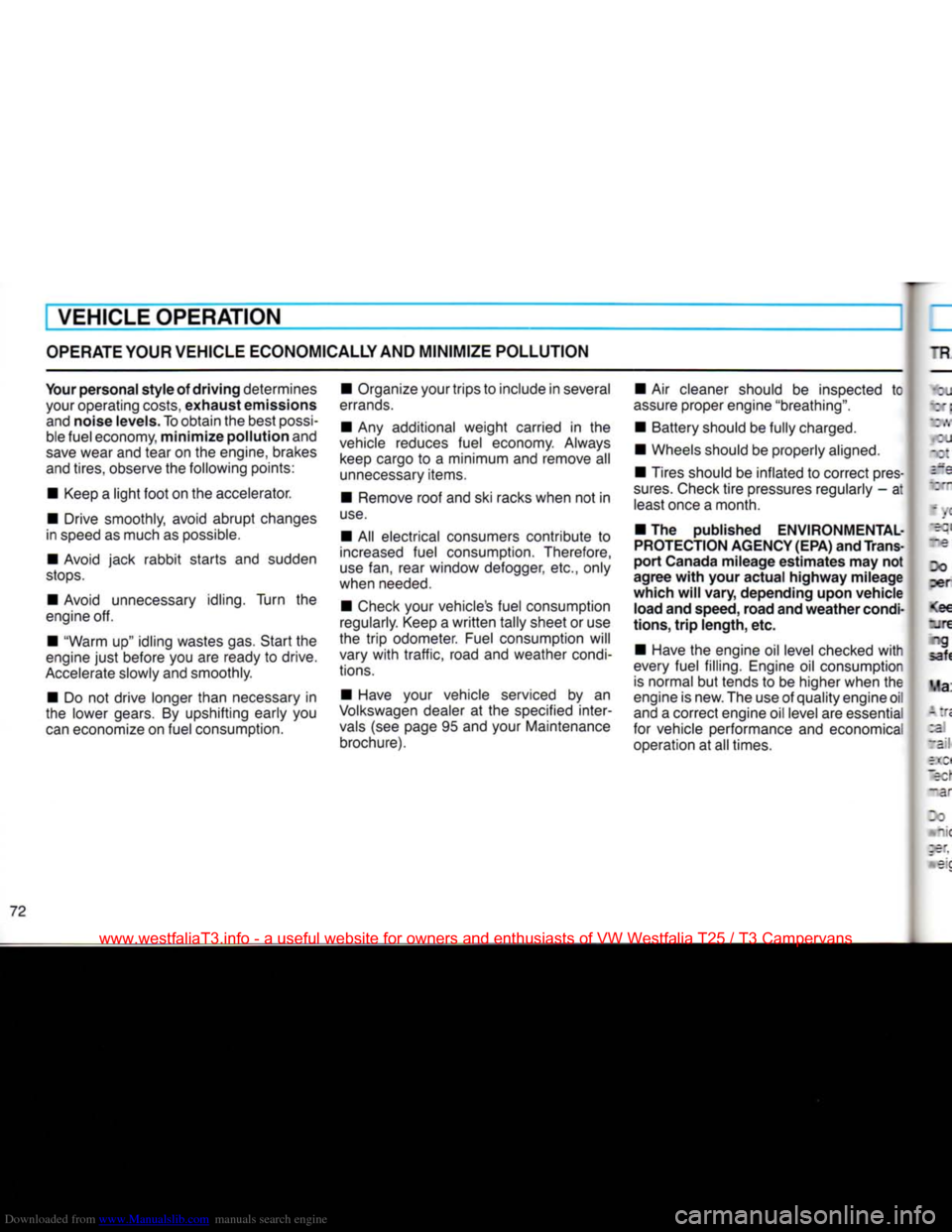
Downloaded from www.Manualslib.com manuals search engine
VEHICLE OPERATION
OPERATE
YOUR VEHICLE ECONOMICALLY AND
MINIMIZE
POLLUTION
Your
personal
style
of
driving
determines your operating costs,
exhaust
emissions and noise levels. To obtain the best
possi
ble fuel economy,
minimize
pollution
and
save
wear and tear on the engine, brakes
and tires, observe the following points:
• Keep a
light
foot
on the accelerator.
• Drive smoothly, avoid abrupt changes
in speed as much as possible.
• Avoid jack rabbit starts and sudden
stops.
• Avoid unnecessary idling. Turn the
engine off.
• "Warm up" idling wastes gas. Start the
engine
just
before you are ready to drive.
Accelerate
slowly and smoothly.
• Do not drive longer than necessary in
the lower gears. By upshifting early you
can
economize on fuel consumption. • Organize your trips to include in several
errands.
• Any additional weight carried in the
vehicle reduces fuel economy. Always keep cargo to a minimum and remove all
unnecessary
items.
• Remove roof and ski racks when not in
use.
• All electrical consumers contribute to
increased
fuel consumption. Therefore,
use
fan, rear window defogger, etc., only
when needed.
• Check your vehicle's fuel consumption
regularly. Keep a
written
tally sheet or use
the
trip
odometer. Fuel consumption will
vary
with
traffic, road and weather condi
tions.
• Have your vehicle serviced by an
Volkswagen
dealer at the specified inter
vals
(see page 95 and your Maintenance brochure). • Air cleaner should be inspected to
assure
proper engine "breathing".
• Battery should be fully charged.
• Wheels should be properly aligned.
• Tires should be inflated to correct pres
sures.
Check
tire
pressures regularly - at least once a month.
• The published ENVIRONMENTAL-
PROTECTION AGENCY (EPA) and Trans
port
Canada
mileage
estimates
may not
agree
with
your
actual
highway
mileage
which
will
vary,
depending
upon
vehicle
load
and speed,
road
and
weather
condi
tions,
trip
length,
etc.
• Have the engine oil level checked
with
every fuel filling. Engine oil consumption
is
normal but tends to be higher when the
engine is new. The use of quality engine oil
and a correct engine oil level are essential
for vehicle performance and economical operation at all times.
72
www.westfaliaT3.info - a useful website for owners and enthusiasts of VW Westfalia T25 / T3 Campervans
Page 89 of 165
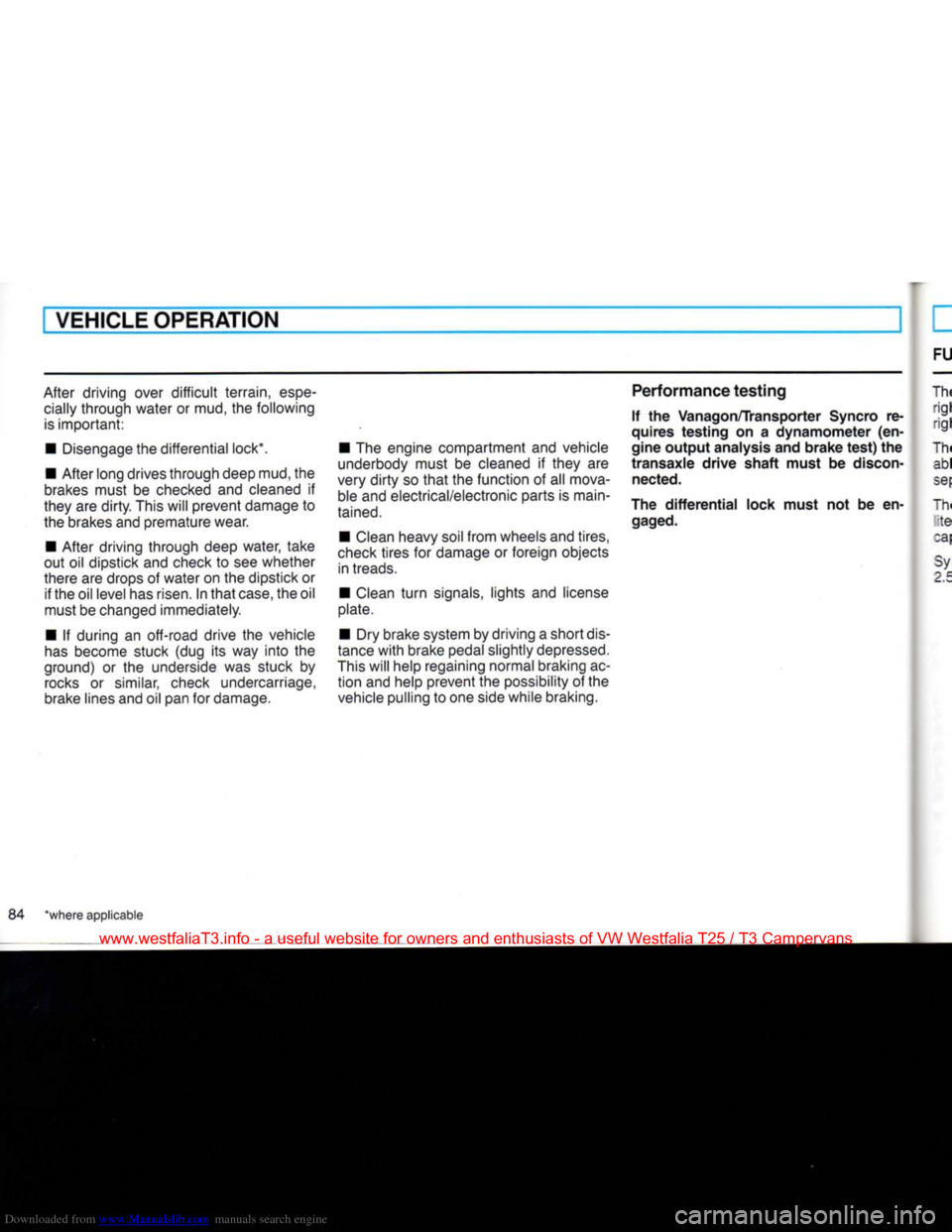
Downloaded from www.Manualslib.com manuals search engine
VEHICLE OPERATION
After driving over
difficult
terrain,
espe
cially through water or mud, the following
is
important:
• Disengage the differential lock*.
• After long drives through deep mud, the
brakes must be checked and cleaned if
they are
dirty.
This will prevent damage to
the brakes and premature wear.
• After driving through deep water, take
out oil dipstick and check to see whether
there are drops of water on the dipstick or if the oil level has risen. In
that
case,
the oil
must be changed immediately.
• If during an off-road drive the vehicle
has
become stuck (dug its way
into
the
ground) or the underside was stuck by
rocks
or similar, check undercarriage,
brake lines and oil pan for damage. • The engine compartment and vehicle
underbody must be cleaned if they are
very
dirty
so
that
the function of all mova ble and electrical/electronic parts is main
tained.
•
Clean
heavy soil from wheels and tires,
check
tires for damage or foreign objects in treads.
•
Clean
turn
signals, lights and license
plate.
• Dry brake system by driving a short dis
tance
with
brake pedal slightly depressed.
This
will help regaining normal braking ac
tion
and help prevent the possibility of the
vehicle pulling to one side while braking.
Performance
testing
If the
Vanagon/Transporter
Syncro re
quires
testing
on a
dynamometer
(en
gine
output
analysis and
brake
test)
the
transaxle
drive
shaft
must
be discon nected.
The
differential
lock
must
not be en gaged.
84 "where applicable
www.westfaliaT3.info - a useful website for owners and enthusiasts of VW Westfalia T25 / T3 Campervans
Page 100 of 165
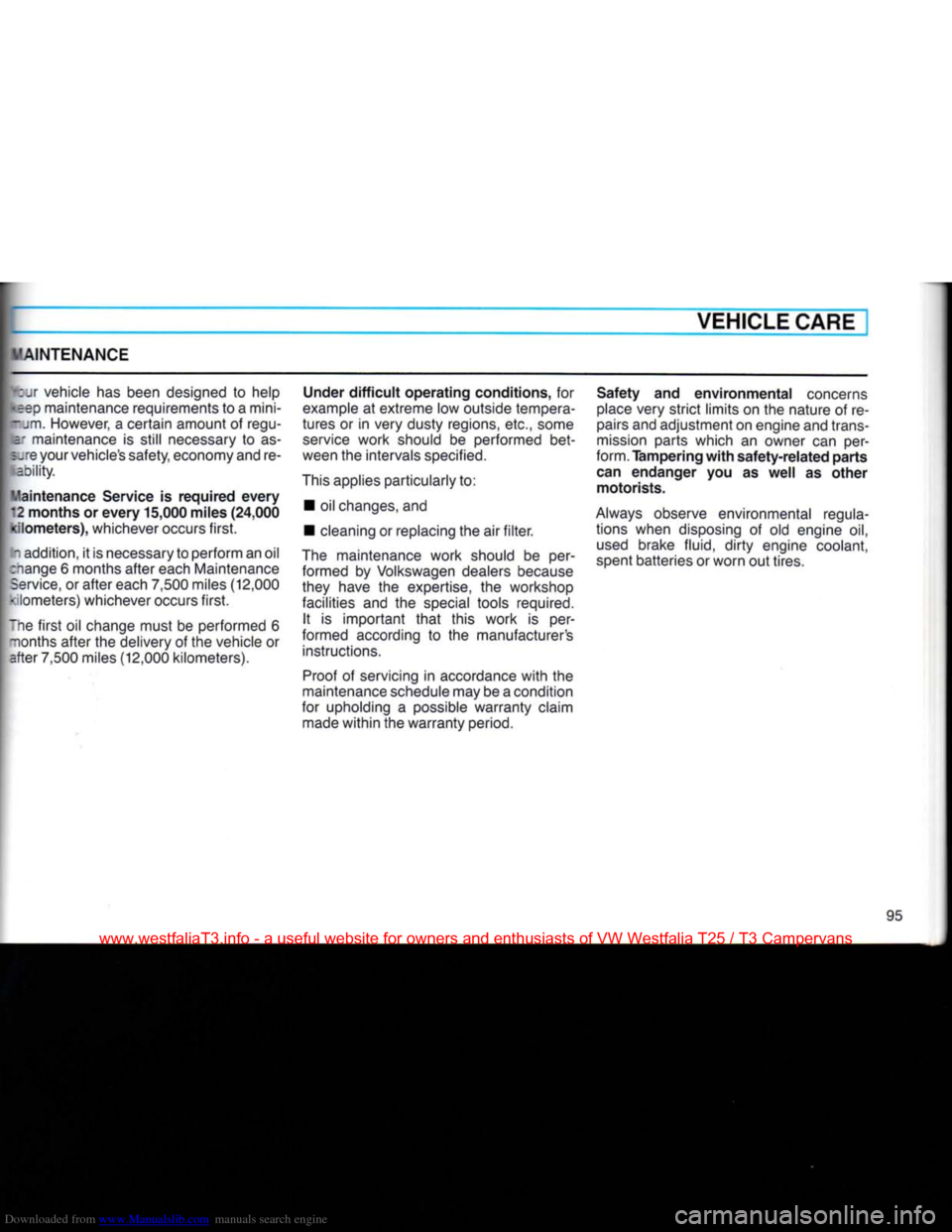
Downloaded from www.Manualslib.com manuals search engine
AINTENANCE
VEHICLE CARE
Ibur
vehicle has been designed to help «eep maintenance requirements to a mini--jm. However, a certain amount of regu
lar maintenance is still necessary to as s-re your vehicle's safety, economy and re- ability.
Maintenance
Service is
required
every
12
months
or
every
15,000
miles
(24,000
kilometers),
whichever occurs
first.
I addition, it is necessary to perform an oil
nange
6 months after each Maintenance
Service,
or after each 7,500 miles (12,000
•: (ometers) whichever occurs
first.
"he
first
oil change must be performed 6 ~ionths after the delivery of the vehicle or
after 7,500 miles (12,000 kilometers).
Under
difficult
operating
conditions, for
example
at extreme low outside tempera
tures or in very dusty regions, etc., some
service
work should be performed bet
ween the intervals specified.
This
applies particularly to: • oil changes, and
• cleaning or replacing the air
filter.
The
maintenance work should be per formed by Volkswagen dealers because
they have the expertise, the workshop facilities and the special tools required. It is important
that
this work is per
formed according to the manufacturer's instructions.
Proof
of servicing in accordance
with
the
maintenance schedule may be a condition
for upholding a possible warranty claim
made
within the warranty period.
Safety
and
environmental
concerns
place
very strict limits on the nature of re
pairs
and adjustment on engine and trans
mission
parts which an owner can per
form.
Tampering
with
safety-related
parts
can
endanger
you as
well
as
other
motorists.
Always
observe environmental regula tions when disposing of old engine oil,
used
brake fluid,
dirty
engine coolant,
spent batteries or worn out tires.
95
www.westfaliaT3.info - a useful website for owners and enthusiasts of VW Westfalia T25 / T3 Campervans
Page 103 of 165
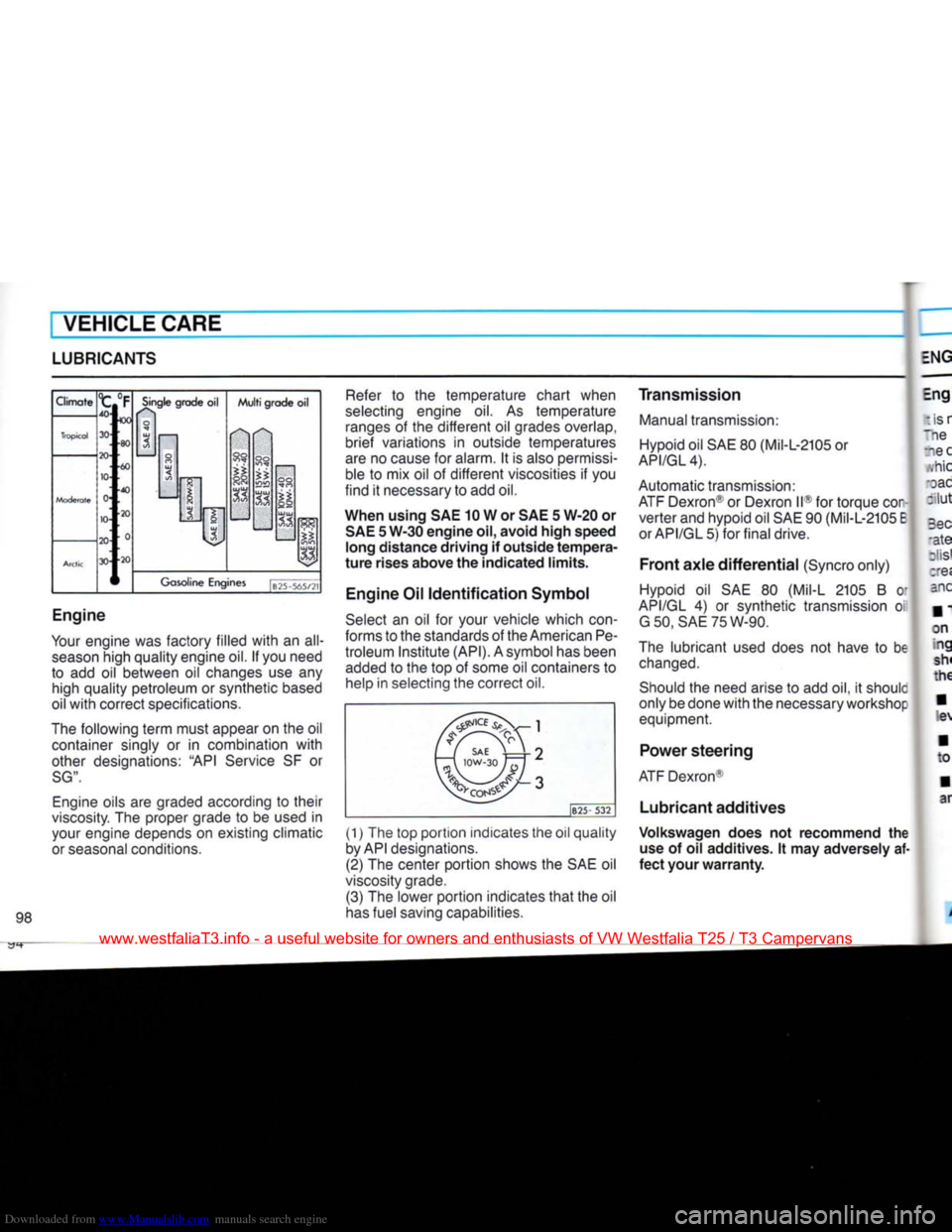
Downloaded from www.Manualslib.com manuals search engine
[
VEHICLE
CARE
LUBRICANTS I
Climate Tropical
40'
30-
20- 10-
0-
10'
20
30'
Single grade oil
Multi grade oil
Gasoline Engines
|B25-565/21
Engine
Your engine was factory filled with an all- season high quality engine oil. If you need
to add oil between oil changes use any high quality petroleum or synthetic based
oil with correct specifications.
The following term must appear on the oil container singly or in combination with
other designations: "API Service SF or
SG".
Engine oils are graded according to their
viscosity. The proper grade to be used in your engine depends on existing climatic
or seasonal conditions. Refer to the temperature chart when
selecting engine oil. As temperature ranges of the different oil grades overlap,
brief variations in outside temperatures
are no cause for alarm. It is also permissi ble to mix oil of different viscosities if you
find it necessary to add oil.
When using SAE 10 W or SAE 5 W-20 or SAE 5 W-30 engine oil, avoid high speed
long distance driving if outside tempera
ture rises above the indicated limits.
Engine Oil Identification Symbol
Select an oil for your vehicle which
con
forms to the standards of the American Pe
troleum Institute (API). A symbol has been added to the top of some oil containers to help in selecting the correct oil.
-l -l
/ / SAE '. j -2
t—i iow-3o jji -3
1B25-
532
98 (1) The top portion indicates the oil quality
by API designations.
(2) The center portion shows the SAE oil
viscosity grade.
(3) The lower portion indicates that the oil
has fuel saving capabilities. Transmission
Manual transmission: Hypoid oil SAE 80 (Mil-L-2105 or
API/GL4).
Automatic transmission:
ATF Dexron® or Dexron II® for torque cor
verter and hypoid oil SAE 90 (Mil-L-2105
E
orAPI/GL5) for final drive.
Front axle differential (Syncro only)
Hypoid oil SAE 80 (Mil-L 2105 B M
API/GL 4) or synthetic transmission oi
G50,
SAE75W-90.
The lubricant used does not have to be
changed.
Should the need arise to add oil, it shoulc
only be done with the necessary workshop equipment.
Power steering
ATF Dexron®
Lubricant additives
Volkswagen does not recommend the use of oil additives. It may adversely af
fect your warranty.
www.westfaliaT3.info - a useful website for owners and enthusiasts of VW Westfalia T25 / T3 Campervans
Page 105 of 165
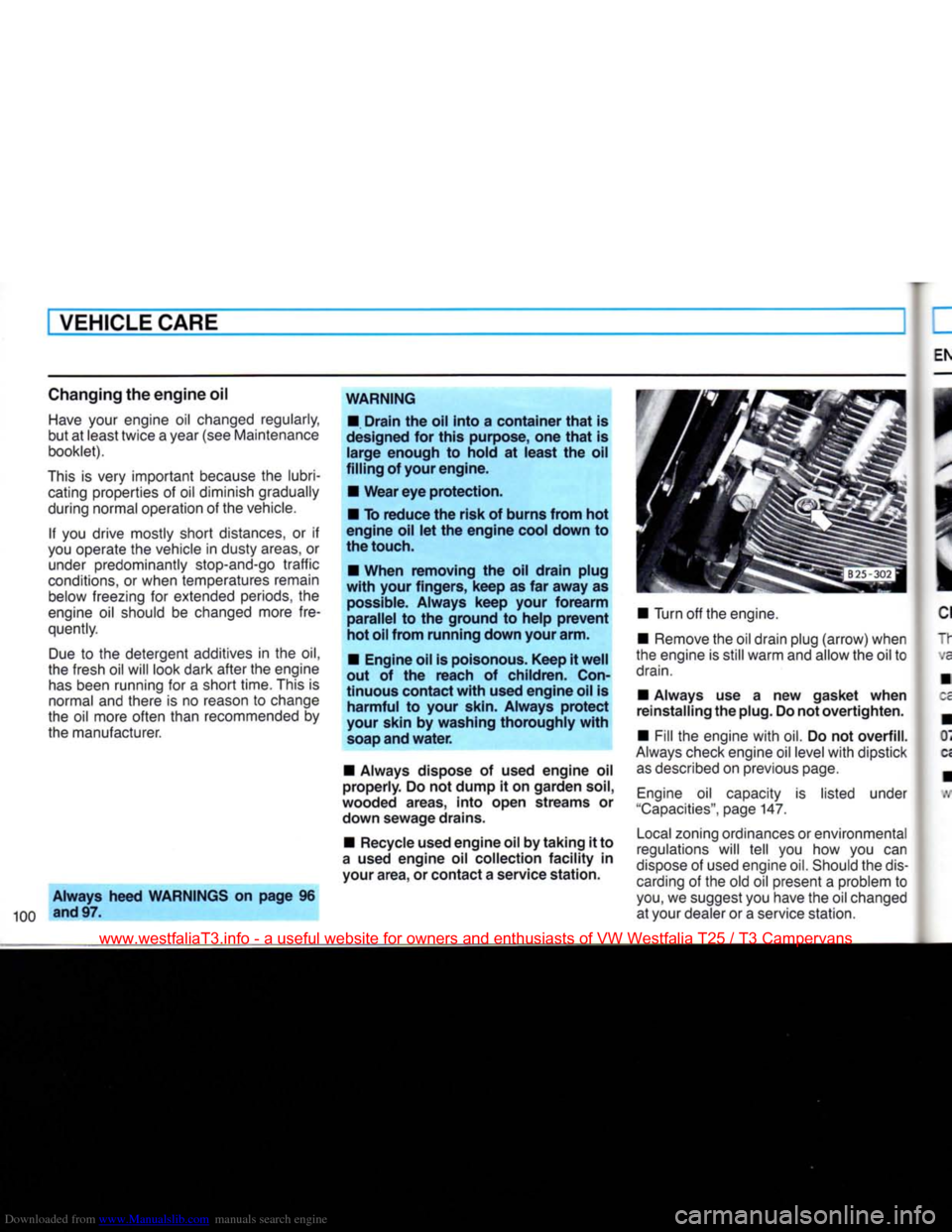
Downloaded from www.Manualslib.com manuals search engine
VEHICLE CARE
Changing the
engine
oil
Have
your engine oil changed regularly,
but at least twice a year (see Maintenance
booklet).
This
is very important because the lubri cating properties of oil diminish gradually
during normal operation of the vehicle.
If you drive mostly short distances, or if
you operate the vehicle in dusty
areas,
or under predominantly stop-and-go traffic
conditions, or when temperatures remain below freezing for extended periods, the
engine oil should be changed more fre
quently.
Due
to the detergent additives in the oil,
the fresh oil will look dark after the engine
has
been running for a short time. This is
normal and there is no reason to change
the oil more often than recommended by
the manufacturer.
Always
heed
WARNINGS
on
page
96
100 and97-
WARNING
•
Drain
the oil
into
a
container
that
is
designed for
this
purpose, one
that
is
large
enough to hold at
least
the oil
filling
of your
engine.
•
Wear
eye
protection.
• To
reduce
the
risk
of burns
from
hot
engine
oil let the
engine
cool
down
to
the touch.
•
When
removing
the oil
drain
plug
with
your fingers,
keep
as far
away
as possible.
Always
keep
your
forearm
parallel
to the ground to
help
prevent
hot oil
from
running
down
your arm.
• Engine oil is poisonous. Keep it
well
out of the
reach
of children. Con
tinuous
contact
with
used
engine
oil is
harmful
to your skin.
Always
protect
your skin by
washing
thoroughly
with
soap and
water.
•
Always
dispose of used
engine
oil
properly.
Do not
dump
it on
garden
soil,
wooded
areas,
into
open
streams
or
down
sewage
drains.
• Recycle used
engine
oil by
taking
it to
a used
engine
oil collection
facility
in
your
area,
or
contact
a service
station.
• Turn off the engine.
• Remove the oil drain plug (arrow) when
the engine is still warm and allow the oil to
drain.
•
Always
use a new
gasket
when
reinstalling
the plug. Do not
overtighten.
•
Fill
the engine
with
oil. Do not
overfill.
Always
check engine oil level
with
dipstick
as
described on previous page.
Engine
oil capacity is listed under
"Capacities",
page 147.
Local
zoning ordinances or environmental
regulations will tell you how you can
dispose
of used engine oil. Should the dis carding of the old oil present a problem to
you,
we suggest you have the oil changed
at your dealer or a service station.
www.westfaliaT3.info - a useful website for owners and enthusiasts of VW Westfalia T25 / T3 Campervans
Page 106 of 165
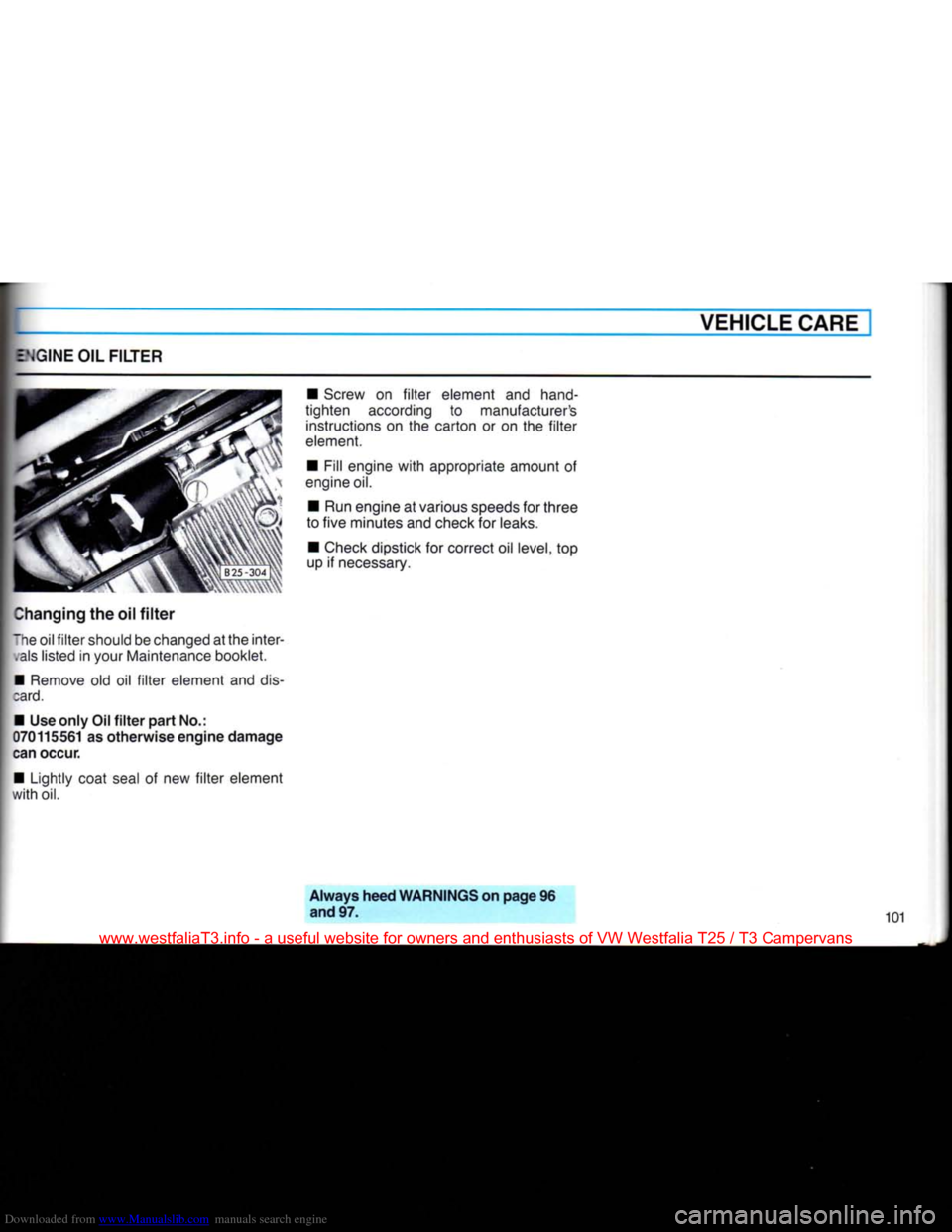
Downloaded from www.Manualslib.com manuals search engine
VEHICLE CARE
ENGINE OIL FILTER
: he oil
filter
should be changed at the inter-
,als
listed in your Maintenance booklet.
• Remove old oil
filter
element and dis
card.
• Use
only
Oil
filter
part
No.:
070115561
as
otherwise
engine
damage
can occur.
• Lightly coat seal of new
filter
element
with
oil. • Screw on
filter
element and hand-
tighten according to manufacturer's instructions on the carton or on the
filter
element.
• Fill engine
with
appropriate amount of
engine oil.
• Run engine at various speeds for three
to five minutes and check for leaks.
• Check dipstick for correct oil level, top
up if necessary.
Always
heed
WARNINGS
on
page
96 and 97. 101
www.westfaliaT3.info - a useful website for owners and enthusiasts of VW Westfalia T25 / T3 Campervans
Page 107 of 165
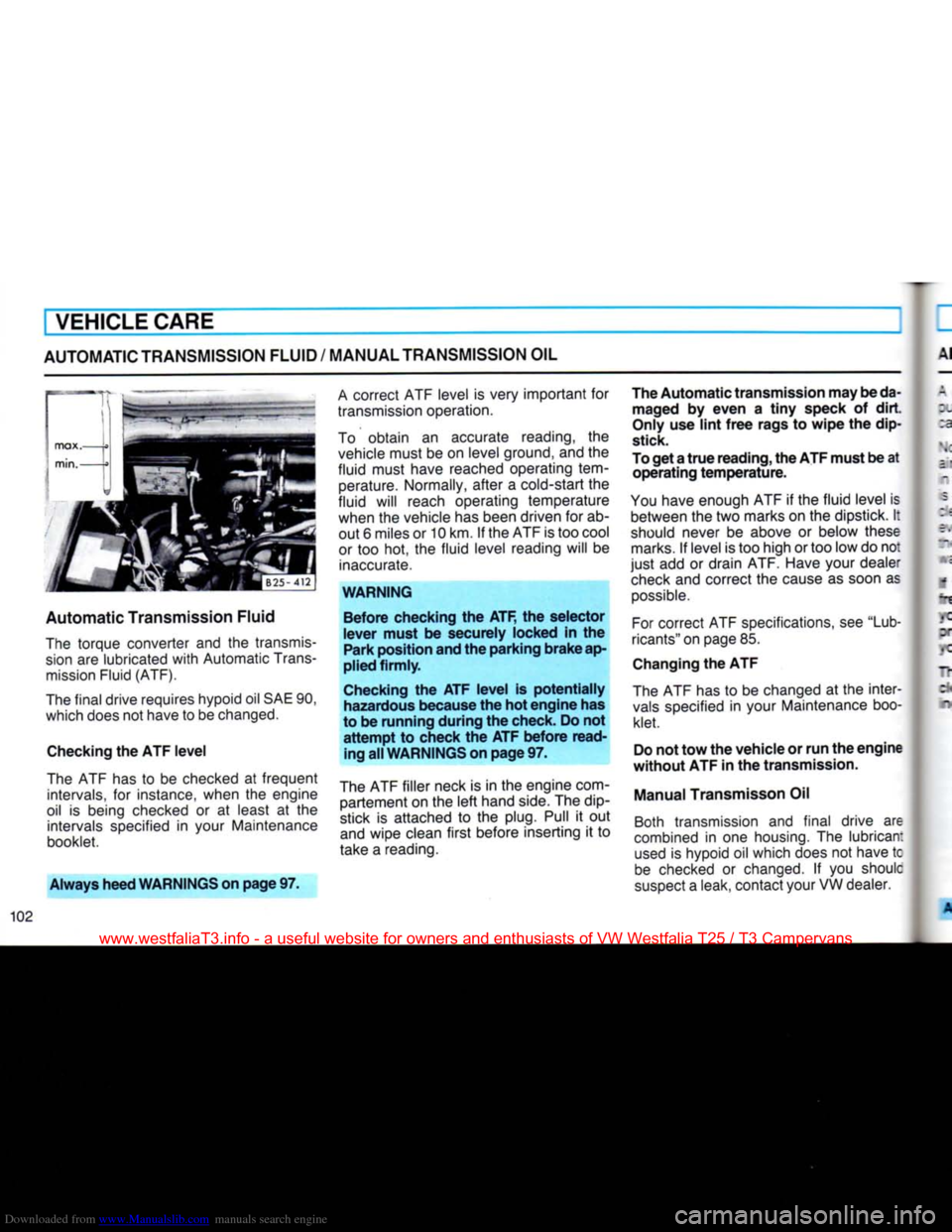
Downloaded from www.Manualslib.com manuals search engine
VEHICLE CARE
AUTOMATIC TRANSMISSION FLUID / MANUAL TRANSMISSION OIL
Automatic Transmission Fluid
The torque converter and the transmis
sion are lubricated with Automatic Trans mission Fluid (ATF).
The final drive requires hypoid oil SAE 90,
which does not have to be changed.
Checking the ATF level
The ATF has to be checked at frequent intervals, for instance, when the engine
oil is being checked or at least at the intervals specified in your Maintenance
booklet.
Always heed WARNINGS on page 97. A correct ATF level is very important for
transmission operation.
To obtain an accurate reading, the
vehicle must be on level ground, and the
fluid must have reached operating
tem
perature. Normally, after a cold-start the
fluid will reach operating temperature when the vehicle has been driven for ab
out 6 miles or 10 km. If the ATF is too cool
or too hot, the fluid level reading will be inaccurate.
WARNING Before checking the ATF, the selector
lever must be securely locked in the Park position and the parking brake ap
plied firmly.
Checking the ATF level is potentially hazardous because the hot engine has
to be running during the check. Do not
attempt to check the ATF before read ing all WARNINGS on page 97.
The ATF filler neck is in the engine com- partement on the left hand side. The dip
stick is attached to the
plug.
Pull it out
and wipe clean first before inserting it to
take a reading. The Automatic transmission may be da
maged by even a tiny speck of dirt.
Only use lint free rags to wipe the dip
stick.
To get a true reading, the ATF must be at operating temperature.
You have enough ATF if the fluid level is between the two marks on the dipstick. I:
should never be above or below these marks. If level is too high or too low do not
just add or drain ATF. Have your dealer check and correct the cause as soon as possible.
For correct ATF specifications, see "Lub
ricants" on page 85.
Changing the ATF
The ATF has to be changed at the inter vals specified in your Maintenance booklet.
Do not tow the vehicle or run the engine
without ATF in the transmission.
Manual Transmisson Oil Both transmission and final drive are
combined in one housing. The lubrican: used is hypoid oil which does not have tc
be checked or changed. If you shoulc
suspect a leak, contact your VW dealer.
www.westfaliaT3.info - a useful website for owners and enthusiasts of VW Westfalia T25 / T3 Campervans